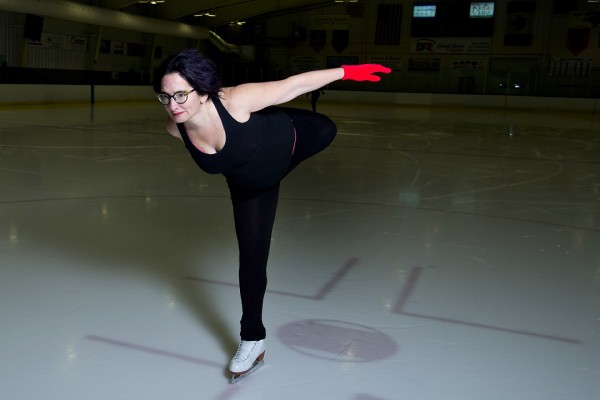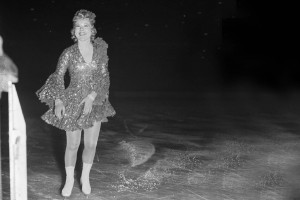
Figuring out Erica Rand, the scholar
When I set out to talk to Erica Rand about her new book, Red Nails, Black Skates, I knew that other interviews and reviews focused on the book’s thematic contents — figure skating and Rand’s own experiences as an adult skater immersed in the sport she’d tried out as a child.
But I was more interested in the scholar than the skates.

A participant as well as scholar of culture, Rand often injects personal experiences into her work. Here, skating in Falmouth, she bends back her leg for a catch-foot spiral, a move she describes in Red Nails, Black Skates. Photograph by Mike Bradley/Bates College.
Red Nails, Black Skates (Duke University Press, 2012) is something of a crash course in Rand’s area of cultural criticism, specifically the overt and insidious ways that gender and sexuality, as well as race and class, shape all of our identities and experiences.
That begs the question — in my case a series of questions — about the intertwined personal, scholarly and pedagogical commitments that influence cultural critics like Rand, the college’s Whitehouse Professor of Art and Visual Culture and of Women and Gender Studies.
In other words, how does she approach writing and teaching about something as both amorphous and intimate as culture?
“We participate in culture,” says Rand. “I want to show how we are participating in culture by modeling a critic who also looks critically at her own investments and the things she studies.”
Asked about her intended audience, Rand replies, “I envisioned the book being for a wide range of people. First of all, I have to admit I really wanted skaters to read it. I’m always interested in having my writing be accessible within and outside academics.
“Although I wanted to say hard and complicated things, I wanted to say it in an accessible way,” she says.
One such strategy was to divide the book into a series of short essays, allowing readers to encounter the ideas at their own pace.
Whether writing about a cultural phenomenon or teaching one of her courses here at Bates, Rand encourages her audience to recognize how they, too, perform and respond to gender.

Nothing about figure skates is more obvious than their “gender coding” by color, Rand writes, which was popularized by Sonja Henie, seen here in Boston in the 1930s. Photo courtesy of the Boston Public Library, Leslie Jones Collection.
In her course Women, Gender, Visual Culture, which she is teaching this semester, Rand asks her students to “understand that it is not as if some people over there have a gender story. Everyone has a gender story.”
That said, she’s not interested in “busting open all kinds of gender notions and throwing them all out.”
She explains that some people find pleasure in traditional expressions of femininity, herself included, and masculinity. What’s important, however, is that those expressions not be the result of restrictive stereotypes.
That self-awareness permeates Rand’s writing. For her, it says something about what she calls “the politics of academic work and the politics of criticism.”
As a scholar, Rand recognizes that she participates in the cultural phenomena she studies and is not shy about putting her personal perspectives front and center.
“People all have a personal stake in what they are studying and working on. They may tell you about it or they may not tell you about it. But I don’t believe, not only with popular culture but in any critical or academic endeavor, that there is a critic at some elevated level looking down.”



